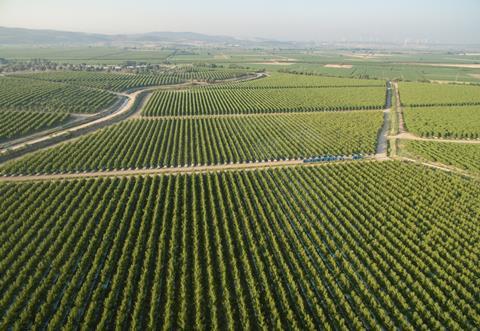Turkish producers of apples, pears and grapes are noticing the impact of climate change, according to the latest report from the Foreign Agricultural Service of the USDA, but exports remain strong

Turkish apple production for 2024/25 is forecast to fall 13 per cent to a five-year low of 4mn tonnes after unusually warm and dry weather conditions, according to a report from the Foreign Agricultural Service of the US Department of Agriculture.
Exports of apples, however, are expected to be up year on year, since large-scale commercial operations were less affected by the adverse weather conditions.
“Growers are blaming climate change for the drop in production,” the report stated. “Warmer temperatures, dry weather conditions, and shortages of irrigation water were cited as the main culprits. The economic losses resulting from this drop in production and lower quality fruit will be a significant setback for many growers who continue to grapple with rising input costs for water, labour, and pest control products.”
The report predicts that more apples will be used for juice production in 2024/25, due to the predominance of smaller sized, lower quality fruit.
Turkey’s top export destinations have been India, Iraq, Libya, Russia, Syria and Saudi Arabia. Exports to India rose from 30,000 tonnes in 2018/19 to almost 130,000 in 2023/24, the main variety being Red Delicious.
Producers respond to pear popularity
Pear production is expected to break records due to favourable weather conditions in key growing areas, with consumption and exports both predicted to rise. Production is forecast to reach 600,000 tonnes, up about 12 per cent from last year.
Overall pear production has increased by 15 per cent in the last five years, mostly due to increasing demand from markets including Russia, Iraq and Romania, with growers investing in new orchards and planting varieties suited to export markets. The main varieties grown are Santa Maria, Akca, Mustafabey, Cassia, Williams, Ankara and Deveci.
Exports for 2024/25 are predicted to increase to 80,000 tonnes, up from last year’s 60,000 tonnes, with Russia the leading destination, accounting for a third of export volumes.
Gradual growth in grapes
Grape production has risen from last year to 1.9mn tonnes, according to the report, but remains under the long-term average due to losses suffered as a result of mildew disease.
For 2024/25, exports are forecast at 150,000 tonnes, a slight increase mainly due to a rise in domestic production. In 2023/24, table grape exports reached nearly 142,000 tonnes, with Russia the top destination, followed by Ukraine and Poland.
In recent years, Turkish authorities have introduced measures to address the effects of climate change on the country’s agricultural sector, the report stated, including restrictions on the production of water-intensive crops in water-scarce areas.
“The government is reportedly also considering new laws and regulations to promote sustainable agriculture practices across the full spectrum of row crops, tree nuts, fruits, and vegetables,” the USDA said. “While the status and specific details of this pending legislation are unknown, the government is expected to impose limits on the number of new orchards of deciduous fruits and control water use in areas suffering from water shortages.”



